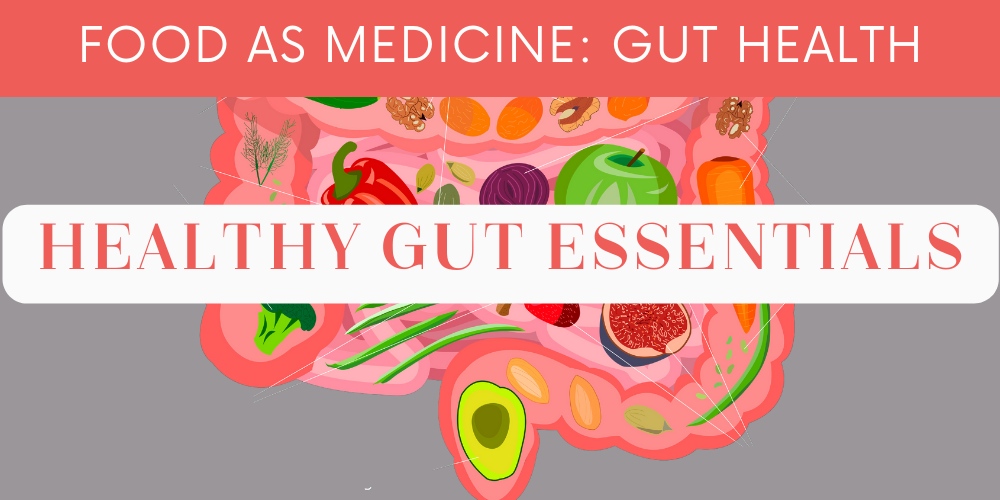Hippocrates told us that health begins and ends in the gut. Without it functioning correctly, you are at risk for infections, inflammation, auto-immune diseases, and hormone balances (most of which will be misdiagnosed as other conditions).
Tending to your gut requires keeping it healthy with beneficial bacteria and reducing what can cause more stress and irritation. This month's Food as Medicine Issue is focused on Healthy Gut Essentials. If you want to improve your gut's health through food and nutrition therapy, reach out to schedule a consult.
-Stephanie
|
|
|
Healthy Gut Essentials:
|

Prebiotics: Prebiotics are the indigestible components of some foods. For the most part, prebiotics are abundant and easy to source because they naturally occur in foods that are good for you. Therefore, there is no need for most people to take a prebiotic supplement.
Why are prebiotics essential for a healthy gut?
- Support healthy gut bacteria, which in turn can enhance digestion and metabolism.
- Promote a healthier immune system by creating an environment that is difficult for disease-causing bacteria to survive.
- Prebiotics can enhance mineral absorption, especially calcium and magnesium.
- Promote healthy blood levels, including lower blood cholesterol, stabilizing blood sugar levels, and improving insulin response.
How to Increase Prebiotic Intake:
- Eat more plant-based foods, including vegetables, fruits, nuts, seeds, beans, legumes, and whole grains
- Start your day with a high-fiber breakfast cereal such as bran flakes or oatmeal
- Boost your mid-afternoon slump by snacking on fruit, nuts, and seeds
- Add beans and legumes to your favorite soups and salads for dinner
Pro Tip: Opt for sprouted grains like Ezekiel bread, cereal, or pasta. Sprouted grains are usually easier to digest, and their nutrients are absorbed more efficiently.
Probiotics: Probiotics are live bacteria and yeasts, similar to the microorganisms that naturally live in your gut. Scientists have discovered that there’s a wide variety of different types, and, therefore, probiotics are differentiated by the strain of bacteria.
If you’ve ever looked for a probiotic, you’ve probably been overwhelmed and confused by the long and complicated names. There is a good chance you’ve said something like, “Somebody told me to take a probiotic, but what does Lactobacillus acidophilus or Bifidobacteria longum even mean?” To help simplify things, remember variety is key! For specific recommendations, schedule a private consultation!
Why are probiotics essential for a healthy gut?
- They help promote a healthy bacteria balance in the gut by counteracting unhealthy gut bacteria from a poor diet, inflammation, antibiotics, and illnesses.
- Probiotics help restore the natural balance of gut bacteria and can help improve symptoms of IBS.
- Probiotics have been found to prevent or reduce diarrhea and treat and prevent vaginal yeast infections.
- A healthy gut means a more productive day, and getting things checked off your list is a sure way to enhance positivity.
How to Increase Probiotic Intake:
- Include fermented foods, such as yogurt, sauerkraut, kefir, miso, and tempeh, as a regular part of your diet.
- Sip on gut-healing beverages such as kombucha, green tea, and bone broth.
- Snack on plain or minimally sweetened yogurt and mix it with fresh fruit.
- Eat a variety of fermented foods to maximize the benefits of probiotics.
- Consider supplementing your diet with a probiotic supplement. Consult with your healthcare provider for specific recommendations.
Pro Tip: Healthy Gut Hacks: Kombucha is an excellent alternative to soda and can be an easy mid-afternoon “pick me up.” Replace your morning or afternoon coffee with kombucha.
|
|
|
Gut Inflammation Triggers
|

Being aware and informed on what’s hurting your gut is just as important as knowing how you can heal and repair it. Here are a few of the most common nutrition and lifestyle factors that contribute to stomach pains, such as bloating, gas, nausea, loss of appetite, heartburn, and more:
- Non-Steroidal Anti-Inflammatory Drugs (NSAIDs). Common NSAIDs include aspirin, Celebrex, Voltaren, ibuprofen, Motrin, Advil, Aleve, and Naprosyn. While there is a time to take NSAIDs, long-term use can result in side effects, including heartburn, gas, stomach pain, bloatedness, nausea, vomiting, diarrhea, and constipation. If you experience any of these symptoms, discuss them with your physician and treatment team.
- Sugar and Refined Flour. Excessive sugar and refined flour intake can cause inflammation in the body and promote the growth of unhealthy gut bacteria.
- Alcohol. Alcohol, even small to modest amounts, causes your stomach to produce more acid than usual. Over time, this can cause inflammation of the stomach lining and lead to gastritis.
- Excessive Coffee Consumption. Coffee is high in caffeine and acidic, causing the stomach to produce hydrochloric acid (HCL), which can contribute to heartburn and indigestion. If you find yourself experiencing some of these issues, reduce or eliminate coffee intake until symptoms subside.
- Stress. While stress does not cause gastritis, it can make things worse. It is essential to find healthy ways to manage stress throughout life.
|
|
Featured Recipe
Lentils with Roasted Veggies and Yogurt Sauce
|

Recipe by: Pulses
Ingredients:
- 1 cup green lentils
- 2 golden beets, peeled and chopped
- 4 carrots, peeled and cut lengthwise
- 1 tbsp olive oil
- 1/2 tsp sea salt
- 1/2 tsp pepper
- 2 cloves garlic
- 1 tsp lemon zest
- 1/2 cup plain yogurt, whole milk
- 1 tbsp olive oil
- 1 bunch of parsley, chopped
Instructions:
- Cook lentils: add 1 cup dry lentils and 2 cups water to a large pot. Bring to a boil, reduce heat, and simmer for 20-30 minutes or until lentils are tender. Drain excess water and set aside.
- While lentils cook, preheat the oven to 400 degrees F and line a baking tray with parchment paper.
- Add golden beets and carrots to the baking sheet. Drizzle with olive oil and sprinkle with sea salt and pepper. Roast for 20-30 minutes or until tender and caramelized.
- Prepare the yogurt sauce: use a blender or food processor to blend garlic, lemon zest, whole milk yogurt, and olive oil. Blend until smooth and creamy.
- Mix the salad with cooked lentils, roasted vegetables, and chopped parsley. Drizzle with yogurt sauce, and enjoy!
Serves: 4
Nutrition Facts Per Serving: 290 calories, 8 grams fat, 1.5 grams saturated fat, 5 mg cholesterol, 400 mg sodium, 43 grams carbohydrates, 8 grams fiber, 14 grams protein
|
|
|
Be Inspired
|
|

|
|
|
About SO Nutrition
|
 Stephanie Leipprandt Ouellette, MBA, RDN, LD
Stephanie Leipprandt Ouellette, MBA, RDN, LD Stephanie has been working in the field of nutrition and dietetics since 1995. She earned a Bachelor of Science degree in Dietetics from Michigan State University, completed an Approved Pre-Professional Practice Program at Western Michigan University and earned a Master of Business Administration from Baker College. She’s been a Registered Dietitian Nutritionist since 1996 and licensed in Texas since 2007. In 2008, Stephanie earned her certification in Childhood and Adolescent Weight Management. Stephanie has extensive clinical & managerial experience, both in corporate settings and in the community. Now she wants to share her knowledge with you, because most (if not all) nutritional habits begin at home.
Stephanie and her family reside in Katy, Texas
|
|
| |
Copyright © 2023 Customized Nutrition Newsletters, All rights reserved.
|
|
| |
|
|